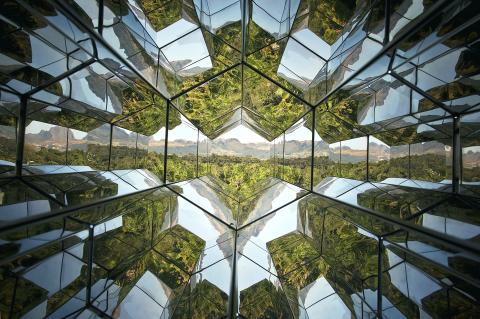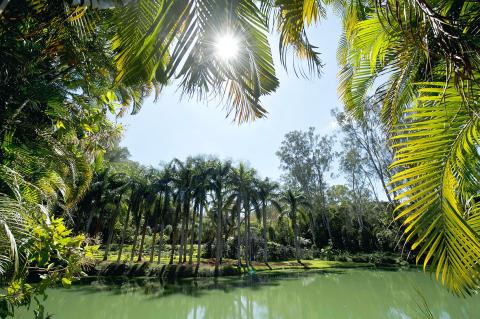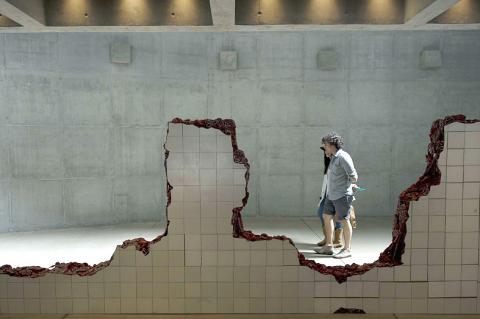Brazilian millionaire Bernardo Paz has dedicated his life to turning a vast outdoor park of tropical rainforest studded with contemporary art works into one of the most original museums in the world.
Part botanical garden, part gallery, Inhotim is the expression of Paz’s unstoppable dream — and of the fortune he amassed in iron ore mining when Chinese demand for raw materials was booming.
However, today, while the tycoon’s dream is intact, Brazil’s economic crisis and the drop in China’s appetite mean his fortune can no longer keep up.

Photo: AFP
Inhotim covers the area of about 300 soccer pitches, an oasis of tropical rainforest in the heart of Brazil’s mining region Minas Gerais. Dotted through the foliage are hundreds of works of art produced by about 200 international artists.
And despite being far from the main cities of Rio or Sao Paulo, almost half a million make the journey there every year.
It is a place, says Paz, 64, “where people want to stay.”

Photo: AFP
Paz has lived within the park for years, now with his sixth wife and two of his seven children. However, even in this paradise, where toucans and monkeys roam freely, there is no way to escape the economic gloom growing in the Latin American giant.
He directly finances one-third of Inhotim’s budget and because iron ore prices halved last year, down to about US$50 a tonne, the 64-year-old with the look of a refined hippie is reluctantly having to tame his wild dreams.
“I was going to keep growing Inhotim at the same speed, but my industries which give me the resources to keep the process going are complicated,” he said regretfully in an interview. “The world is very complicated.”

Photo: AFP
The 1,000 hectare area contains 140 hectares of gardens open to the public and another 100 hectares of protected Atlantic rainforest and tropical savannah.
There are 4,200 different plants, including more than 330 species of orchids. There are emerald and turquoise lagoons. There is an ancient tree that seems to touch the sky and thickets of giant palms.
“You arrive at Inhotim stressed and tired from the journey, then 40 minutes later you’ve turned into a child and don’t want to leave,” Paz says, chain-smoking cigars.
Paz’s friend, the well-known landscaper Burle Marx, gave him advice, but Inhotim is basically spontaneous, he says.
Visitors can simply enjoy nature’s genius, including in a 25,000m2 educational nursery, or spend time in the libraries and classrooms. Or they can contemplate human creativity instead.
For example, there is Red Shift, an installation created by Brazilian Cildo Meireles, which takes the visitor on a journey at once intimate and violent.
You start by entering a room that is entirely red — the carpet, furniture, pictures, typewriter, even the piece of paper waiting to be written on in the typewriter.
Following the sound of a running tap, you advance barefoot into the dark, walking cautiously until arriving at a feebly lit sink gushing red water.
After this study in scarlet, returning to the rich greens of Brazilian nature is a relief.
Continue down the path and the visitor will find Linda do Rosario, by Adriana Varejao, Paz’s fifth wife and one of Brazil’s most-sought-after artists.
The piece is a reflection on Brazil’s colonial history.
It appears as two large walls: one decorated with giant blue and white waves in the traditional Portuguese style and one that is plain white, but broken to reveal an interior of realistic-looking human organs instead of bricks.
Further along, US artist Doug Aitken’s Sonic Pavilion plays back what it calls the breathing of the planet captured on microphones 202m under the earth.
Inhotim is like Paz’s kingdom and although he employs 800 staff, he keeps close personal tabs on the operation, navigating the site in a golf cart.
Despite the tranquility, there are places within the park, about 60km from the city of Belo Horizonte, from which the huge tractors and excavators of the surrounding iron ore mines can be both heard and seen.
These days the reminders of industrial activity are not quite so comforting for Paz.
With Brazil on the cusp of recession, commodity prices slipping and inflation close to double digits, Paz is having to look for corporate sponsors to share some of the US$2.5 million he personally spends on Inhotim each year.
The rest of the US$11.7 million budget is financed through donations, tax breaks, event facilities and sales of tickets at between US$7 and US$11.
He is working further on the business side of things at the park, with plans for a first boutique hotel to open next year, two years late, and eventually 28 new galleries, more hotels, an amphitheater and a community of luxury villas.
Paz, the son of a communist arts lover and an engineer, says he wants to keep Inhotim from becoming too exclusive.
On Wednesdays, there is no entry fee and he puts on frequent public art and educational events, including art and community activism classes that have seen teenagers make trips from Brazil to London or New York.
Locally, Paz is seen as a hero. The nearest town, Brumadinho, relies heavily on the iron ore mines for jobs, while many of the park employees are also locals.
“Senor Bernardo is a great person, a visionary. Few people in the world could do what he has done,” said one park employee, Antonio Lopes, whose 12-year-old daughter is studying the violin in an Inhotim project.
Paz says his vision is not easy to achieve. However, even if he is cramped financially, he is still thinking big.
“Think of this place in a thousand years,” he said.

Real estate agent and property developer JSL Construction & Development Co (愛山林) led the average compensation rankings among companies listed on the Taiwan Stock Exchange (TWSE) last year, while contract chipmaker Taiwan Semiconductor Manufacturing Co (TSMC, 台積電) finished 14th. JSL Construction paid its employees total average compensation of NT$4.78 million (US$159,701), down 13.5 percent from a year earlier, but still ahead of the most profitable listed tech giants, including TSMC, TWSE data showed. Last year, the average compensation (which includes salary, overtime, bonuses and allowances) paid by TSMC rose 21.6 percent to reach about NT$3.33 million, lifting its ranking by 10 notches

Popular vape brands such as Geek Bar might get more expensive in the US — if you can find them at all. Shipments of vapes from China to the US ground to a near halt last month from a year ago, official data showed, hit by US President Donald Trump’s tariffs and a crackdown on unauthorized e-cigarettes in the world’s biggest market for smoking alternatives. That includes Geek Bar, a brand of flavored vapes that is not authorized to sell in the US, but which had been widely available due to porous import controls. One retailer, who asked not to be named, because

SEASONAL WEAKNESS: The combined revenue of the top 10 foundries fell 5.4%, but rush orders and China’s subsidies partially offset slowing demand Taiwan Semiconductor Manufacturing Co (TSMC, 台積電) further solidified its dominance in the global wafer foundry business in the first quarter of this year, remaining far ahead of its closest rival, Samsung Electronics Co, TrendForce Corp (集邦科技) said yesterday. TSMC posted US$25.52 billion in sales in the January-to-March period, down 5 percent from the previous quarter, but its market share rose from 67.1 percent the previous quarter to 67.6 percent, TrendForce said in a report. While smartphone-related wafer shipments declined in the first quarter due to seasonal factors, solid demand for artificial intelligence (AI) and high-performance computing (HPC) devices and urgent TV-related orders

Prices of gasoline and diesel products at domestic fuel stations are this week to rise NT$0.2 and NT$0.3 per liter respectively, after international crude oil prices increased last week, CPC Corp, Taiwan (台灣中油) and Formosa Petrochemical Corp (台塑石化) said yesterday. International crude oil prices last week snapped a two-week losing streak as the geopolitical situation between Russia and Ukraine turned increasingly tense, CPC said in a statement. News that some oil production facilities in Alberta, Canada, were shut down due to wildfires and that US-Iran nuclear talks made no progress also helped push oil prices to a significant weekly gain, Formosa said